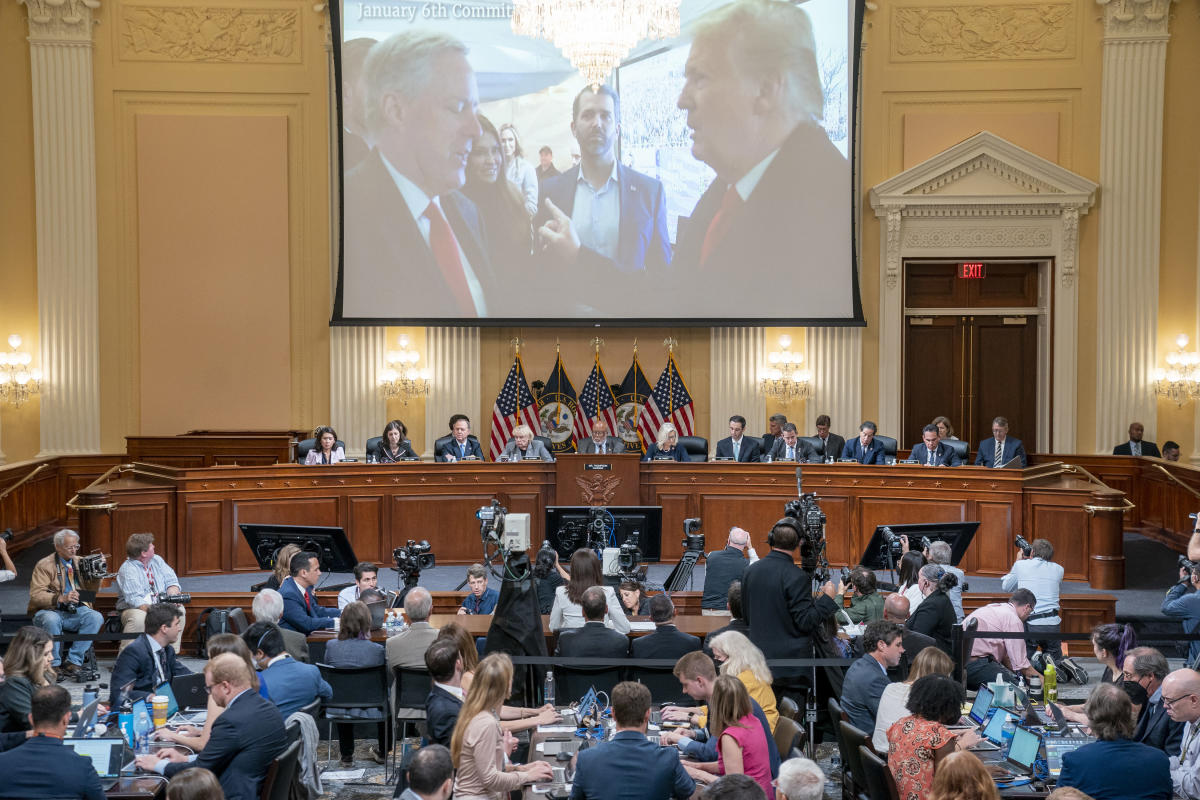
WASHINGTON (AP) — The House committee investigating the Jan. 6 riot is returning to prime time with a Thursday evening hearing that will examine the three-hour plus stretch when Donald Trump failed to act as a mob of supporters stormed the Capitol.
The committee is racing to gather newly emerging evidence and the session could be the final one in a series of public hearings that began in early June. A lawyer for former Trump strategist Steve Bannon, who faces criminal charges after months of defying a congressional subpoena, told the committee over the weekend that Bannon may now be willing to testify, according to committee members.
“I expect that we will be hearing from him and there are many questions that we have for him,” said Rep. Zoe Lofgren, D-Calif. She and other committee members said they intend to have Bannon sit for a private interview, typically done in a deposition with sworn testimony.
Thursday’s hearing will be the first in the prime-time slot since the June 9 debut that was viewed by 20 million people. A hearing Tuesday will focus on the plotting and planning of the insurrection on Jan. 6, 2021, by white nationalist groups such as the Proud Boys, the Oath Keepers and the Three Percenters, and will also highlight testimony taken Friday from former White House counsel Pat Cipollone.
Investigators are digging deeper into the mounds of evidence collected so far about the role extremist groups played in the deadly insurrection and what the former president was doing as the violence ensued down the street from the White House.
Rep. Adam Kinzinger, R-Ill., who will lead Thursday’s hearing with Rep. Elaine Luria, D-Va., described the upcoming testimony as key to providing an extensive timeline of what Trump did and did not do in those critical hours on the afternoon of Jan. 6, 2021. That includes Trump’s tweet criticizing Vice President Mike Pence for lacking “courage” as angry protesters outside the Capitol were heard chanting “Hang Mike Pence” for not challenging Democrat Joe Biden’s 2020 election victory.
“We want to show the American people what was the president doing during that time,” Kinzinger said Sunday. “The rest of the country knew that there was an insurrection. The president obviously had to have known there was an insurrection. So where was he? What was he doing? It’s a very important hearing. Pay attention. Because I think it goes to the heart of what is the oath of a leader.”
News of the hearing comes as Congress returns to Washington after a two-week recess. Lawmakers on the committee had indicated in mid-June there would be no more hearings until July, but in late June they held a surprise hearing for the testimony of former Trump White House aide Cassidy Hutchinson.
Her explosive testimony provided the most compelling evidence yet that Trump could be linked to a federal crime. Since then, the committee of seven Democrats and two Republicans has seen an influx of new information and confidential tips.
Tuesday’s hearing will explore efforts to assemble the mob on the National Mall and then organize the march down Pennsylvania Avenue, where some rioters — armed with pipes, bats and bear spray — charged into the Capitol, quickly overrunning the overwhelmed police force. More than 100 police officers were injured, many beaten, bloodied and bruised, that day.
It will also highlight a meeting on Dec. 18, 2020 at the White House in which former Trump lawyers Sidney Powell and Rudy Giuliani, onetime Trump national security adviser Michael Flynn and others floated the idea of seizing voting machines and invoking national security emergency powers, to the heated objection of several White House lawyers who argued that Trump needed to accept his defeat, according to Rep. Jamie Raskin, D-Md., who will lead Tuesday’s hearing.
“We’re gonna get to use a lot of Mr. Cipollone’s testimony,” he said. “He was aware of every major move, I think, that Donald Trump was making to try to overthrow the 2020 election and essentially seize the presidency.”
Lawmakers also plan on examining the financing of the various rallies and gatherings around Washington that were planned that day.
Bannon’s apparent turnabout in testifying comes as he faces a criminal trial this month on two counts of contempt of Congress for defying the committee’s subpoena. He has argued that his testimony is protected by Trump’s claim of executive privilege, a claim the committee has countered as dubious because Trump had fired Bannon from the White House in 2017 and Bannon was thus a private citizen when he was consulting with Trump in the run-up to the riot.
Bannon has expressed preference for a public hearing, but committee members on Sunday demurred.
“The way that we have treated every single witness is the same, that they come in, they talk to the committee there,” Raskin said. “If they’re going to take a deposition, they’re sworn under oath. It’s videotaped. It’s recorded, and then we take it from there.”
The committee says it wants to hear from Bannon because he “had specific knowledge about the events planned for Jan. 6 before they occurred.” It cited as an example comments that he made on his podcast the day before the riot.
“It’s not going to happen like you think it’s going to happen. OK, it’s going to be quite extraordinarily different. All I can say is strap in,” Bannon said in that podcast. “All hell is going to break loose tomorrow. … So many people said, ‘Man, if I was in a revolution, I would be in Washington.’ Well, this is your time in history.”
Kinzinger spoke on ABC’s “This Week, Lofgren was on CNN’s “State of the Union,” and Raskin appeared on CBS’ “Face the Nation.”
___
Associated Press writer Hannah Fingerhut in Rehoboth Beach, Delaware, contributed to this report.




